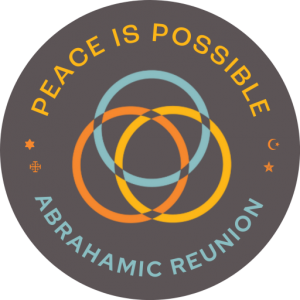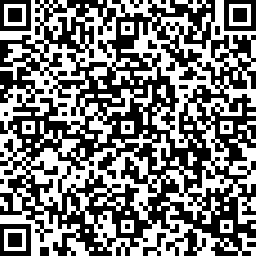Written by Mohamad Jamous (AR Palestinian Director)
It is 6:00 pm on this blessed day in this blessed month of Ramadan, and I am at the height of enthusiasm and happiness. I have been waiting for this day for a long time. You may wonder why I’m so excited. I am very excited because this is the day of the second interfaith iftar for the Abrahamic Reunion in Palestine. I have been working very hard to make this a beautiful event, and I have invited a group of sheikhs and pastors who will illuminate us with the light of their hearts, their ideas, and their warm souls.
 I left my house in Jericho, bringing with me banners, signs, and documents about the Abrahamic Reunion, and went to the Green Valley Hall and Restaurant. I arrived at 6:00 pm and started to prepare the meeting hall. I arranged the tables and chairs, hung signs, checked in with the staff, and made sure the air conditioner would be working on this very hot day.
I left my house in Jericho, bringing with me banners, signs, and documents about the Abrahamic Reunion, and went to the Green Valley Hall and Restaurant. I arrived at 6:00 pm and started to prepare the meeting hall. I arranged the tables and chairs, hung signs, checked in with the staff, and made sure the air conditioner would be working on this very hot day.
Around 7:00 pm, the guests began to arrive. They all had beautiful smiles on their faces and were excited to participate in this important event. The 73 participants came from Nablus, Jenin, Bethlehem, Jericho, and Jerusalem.
Many guest speakers were also invited to the iftar. They were:
- Sheikh Mohammed A-Saeed Salah – the Mufti of the Palestinian National Security Forces
- Father Firas Diab – the Melkite Catholic Priest from the Melkite Catholic Church of Zababdeh, Palestine
- Sheikh Maher Assaf – the chaplain of Political Direction in Bethlehem, Palestine
- Sheikh Amad Abu Shelbaya – the imam of Masjid al Zababdeh in Zababdeh, Palestine
- Father Bolous Allam – the pastor of the Roman Church of Bethlehem, Palestine
- Father Jamil Khader – the pastor of the Good Shepherd Episcopal Church of Nablus, Palestine
 At 7:30, with everyone there, it was time to eat. The break fast meal was an open buffet consisting of many types of salad, and many hot dishes, such as chicken stuffed with rice, fish, and pasta. There was squash, grape leaves, and many kinds of fruit. To drink, we had soft drinks, water, and the special tamarind juice that many people make during Ramadan.
At 7:30, with everyone there, it was time to eat. The break fast meal was an open buffet consisting of many types of salad, and many hot dishes, such as chicken stuffed with rice, fish, and pasta. There was squash, grape leaves, and many kinds of fruit. To drink, we had soft drinks, water, and the special tamarind juice that many people make during Ramadan.
After the meal, everyone had coffee and water, then gathered together in the hall again to hear the guest speakers.
 I welcomed all of the participants and speakers, and introduced myself as the Palestinian Director of the Abrahamic Reunion. I explained the AR’s work and spoke about the importance of our activities, meetings, conferences, and various programs. I talked about the importance of love, unity, and peace between all religions, and how we are using religion as a force for peace for all people.
I welcomed all of the participants and speakers, and introduced myself as the Palestinian Director of the Abrahamic Reunion. I explained the AR’s work and spoke about the importance of our activities, meetings, conferences, and various programs. I talked about the importance of love, unity, and peace between all religions, and how we are using religion as a force for peace for all people.
When I finished, I invited Sheikh Mohammed A-Saeed Salah to speak. He began by telling us how powerful it was to see Muslims and Christians at one table together. He said the Abrahamic Reunion is important because we “do not talk and just go home.” Instead, the AR puts its words into action, to make real change. He continued, saying that people of different religions must come together, because we are all part of one body, and “you as the one body are intertwined with your spirits and your hearts on a very large level.” When Sheikh A-Saeed was finished, we all applauded him warmly for his beautiful words that touched all of our hearts.
 I then invited Father Firas Diab to speak. He called on everyone “not to live as Christians or Muslims or Jews or Druze, we are here to open up to the other in order to move towards the other.” He said we must see each other as fellow human beings, and build “friendship, love, and peace.” He warned that politics tries to use religion to turn people against each other. But we must remember that we all live “in the same civilization and the same culture, and our goal is to meet with each other and continue to walk with each other.”
I then invited Father Firas Diab to speak. He called on everyone “not to live as Christians or Muslims or Jews or Druze, we are here to open up to the other in order to move towards the other.” He said we must see each other as fellow human beings, and build “friendship, love, and peace.” He warned that politics tries to use religion to turn people against each other. But we must remember that we all live “in the same civilization and the same culture, and our goal is to meet with each other and continue to walk with each other.”
Next, Sheikh Maher Assaf spoke. He talked about how the Qur’an speaks about Christ, Mary, and Abraham. “Our Qur’an did not come to abolish Christianity, Judaism, or the previous heavenly religions.” He pointed out that the media treats religion “as a commodity, sold and bought” and uses it to “encourage hatred among our people.” But we must not let that happen. We must not let religion divide us. We have to remember that “religion means that I have to do good for others and not just for myself.”
 Sheikh Amad Abu Shelbaya was the next to share with us. He has been to Abrahamic Reunion events in the past, and hosted us at his mosque when we visited the village of Zababdeh, near Jenin, back in October of last year. He described the Abrahamic Reunion as “a living model where the Christian lives next to the Muslim and shares some of the joy and sadness.” He also noted that “the mosque is next to the church. The voices of the Qur’an… joins with church bells.” He said that the relationship between Christians and Muslims has been a “deep-rooted brotherhood since the beginning of Islam,” and that this relationship needs to remain an example of love and religious tolerance. There must be “passion and love among all religions and sects.”
Sheikh Amad Abu Shelbaya was the next to share with us. He has been to Abrahamic Reunion events in the past, and hosted us at his mosque when we visited the village of Zababdeh, near Jenin, back in October of last year. He described the Abrahamic Reunion as “a living model where the Christian lives next to the Muslim and shares some of the joy and sadness.” He also noted that “the mosque is next to the church. The voices of the Qur’an… joins with church bells.” He said that the relationship between Christians and Muslims has been a “deep-rooted brotherhood since the beginning of Islam,” and that this relationship needs to remain an example of love and religious tolerance. There must be “passion and love among all religions and sects.”
Then it was Father Bolous Allam’s turn to speak. He joked that “my brothers… did not leave me anything to say! They said almost everything!” He said he wanted to emphasize how difficult the work the AR is doing is, but how vitally important it is as well. He recalled that “the first meeting [Mohamad Jamous] did two years ago in Palestine did not exceed 20 participants. And now …there are more than 100 involved.” This growth and expansion “shows how successful your work is and the impact it has on the hearts of everyone.” He professed his support of the Abrahamic Reunion with his heart and soul.
 Finally, it was time for our last speaker, Father Jamil Khader. He traveled from Nablus to be at the event, despite having “some important work to do in Nablus.” He put aside that work because, the one “who refuses the call of the Abrahamic Reunion, refuses coexistence and peace between different religions in the Holy Land.” He went on to define coexistence as “living in familiarity and affection… in harmony and trust.” It is possible to come from different religions and create “an environment of understanding… apart from war or violence.” Living in the Holy Land, a place full of conflict and wars, “we must all unite as Muslims, Christians, and Jews… With your unity, your word, your energy, and your strength, we will all succeed in eliminating any phenomenon that tries to divide us.” He ended by saying, “We will work to deliver our message to the whole world that we are Muslims, Christians, Jews, and Druze: an integral part of this land.”
Finally, it was time for our last speaker, Father Jamil Khader. He traveled from Nablus to be at the event, despite having “some important work to do in Nablus.” He put aside that work because, the one “who refuses the call of the Abrahamic Reunion, refuses coexistence and peace between different religions in the Holy Land.” He went on to define coexistence as “living in familiarity and affection… in harmony and trust.” It is possible to come from different religions and create “an environment of understanding… apart from war or violence.” Living in the Holy Land, a place full of conflict and wars, “we must all unite as Muslims, Christians, and Jews… With your unity, your word, your energy, and your strength, we will all succeed in eliminating any phenomenon that tries to divide us.” He ended by saying, “We will work to deliver our message to the whole world that we are Muslims, Christians, Jews, and Druze: an integral part of this land.”
 Each speaker touched the hearts of all of the participants. Afterwards, I invited everyone to open a dialogue and discuss these things with each other. Some of them described the happiness they felt from the event, and shared their hope that the Abrahamic Reunion’s events would bring love and peace among all religions in the Holy Land
Each speaker touched the hearts of all of the participants. Afterwards, I invited everyone to open a dialogue and discuss these things with each other. Some of them described the happiness they felt from the event, and shared their hope that the Abrahamic Reunion’s events would bring love and peace among all religions in the Holy Land
At the end, I looked around and saw all of the participants engaged in conversation and laughter with one another. In their happiness, I saw how our monthly meetings work to influence people and bring them together.
We are not Muslims, we are not Christians, we are not Jews, and we are not Druze. We are all one human. We worship one Lord, our God is one, and our unity will bring peace to the earth.



